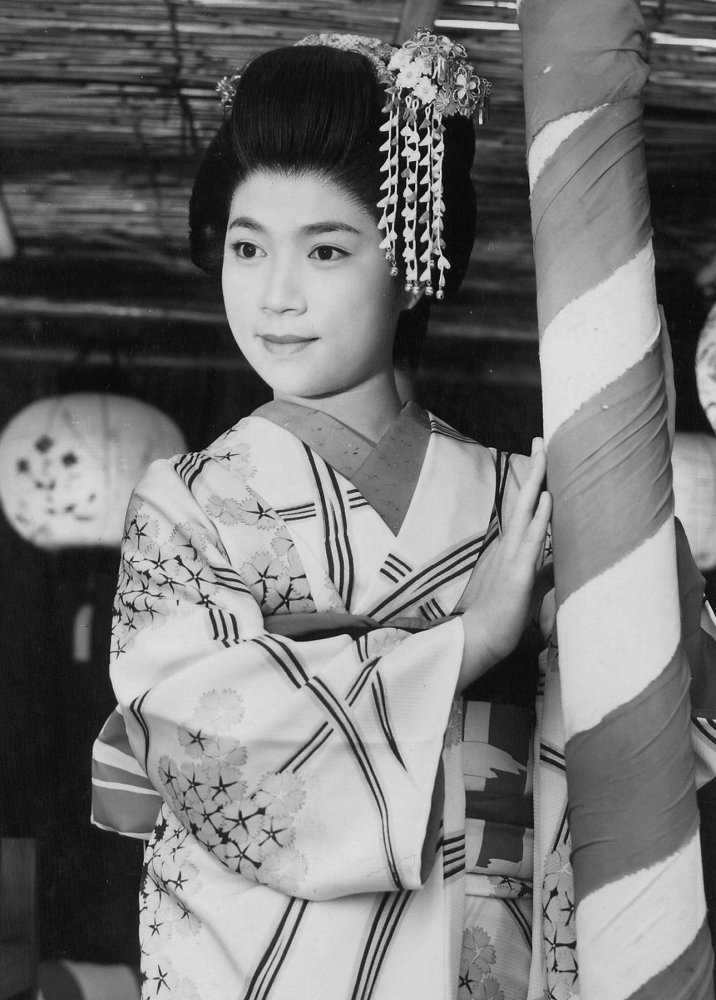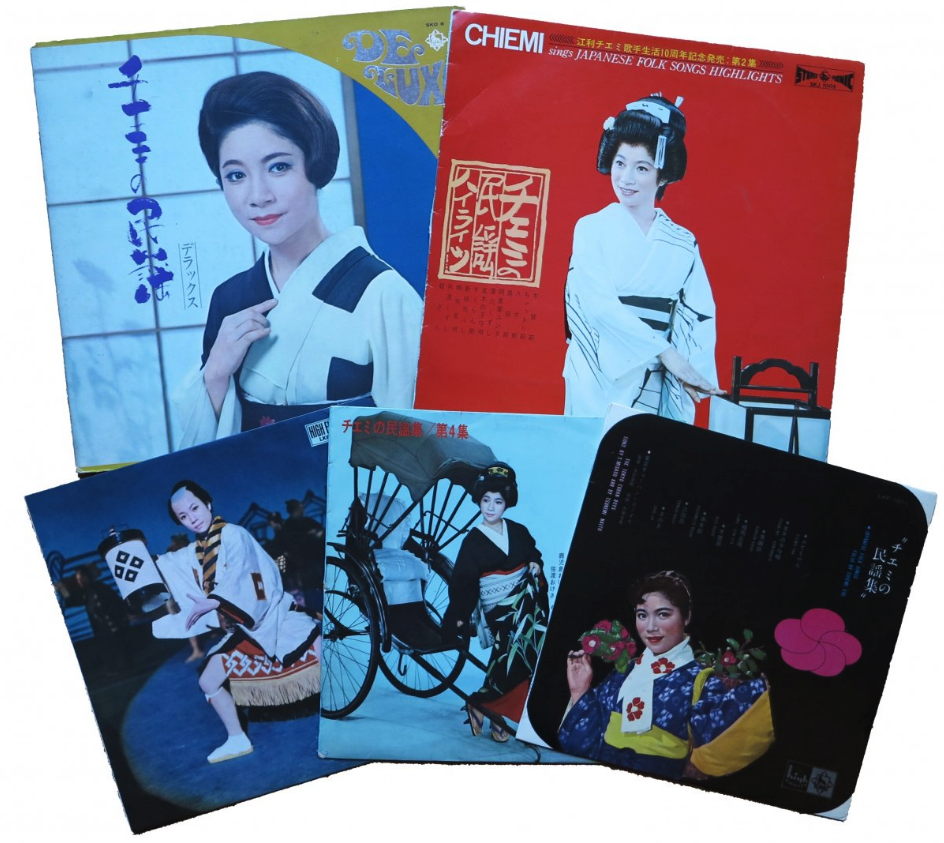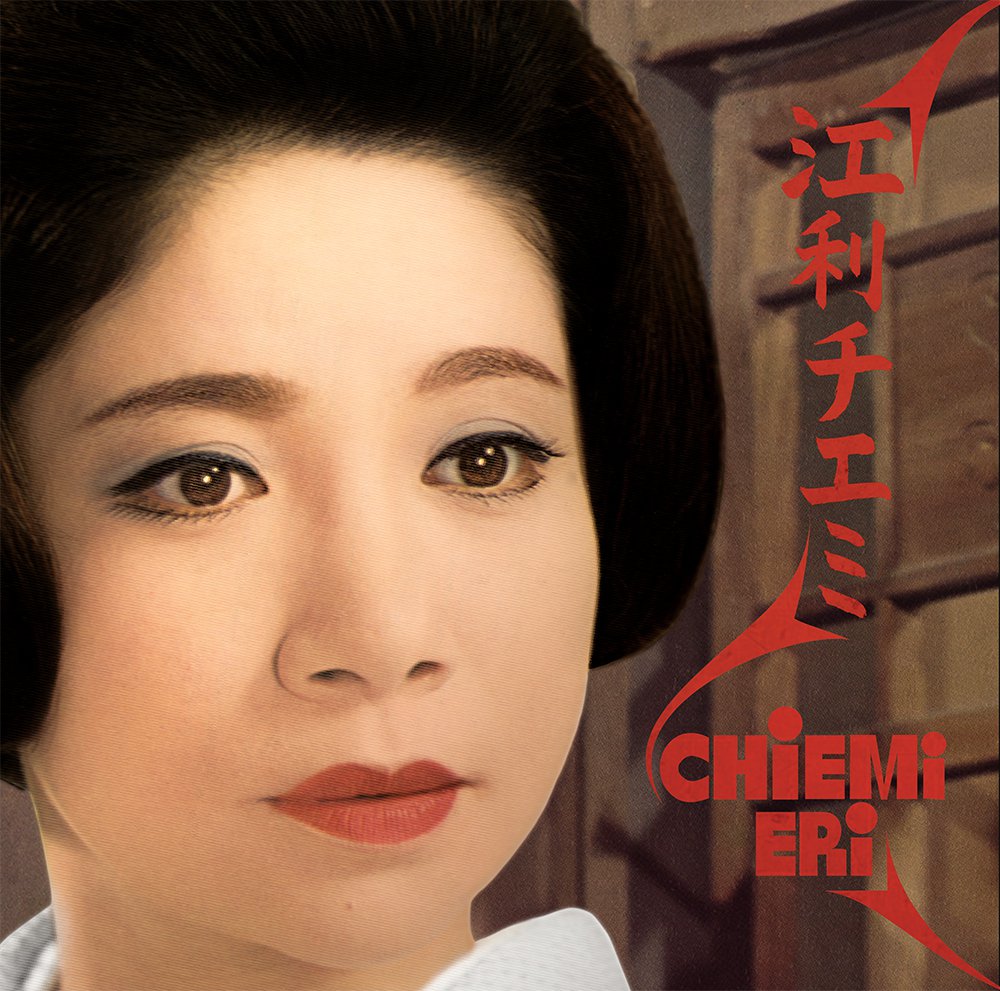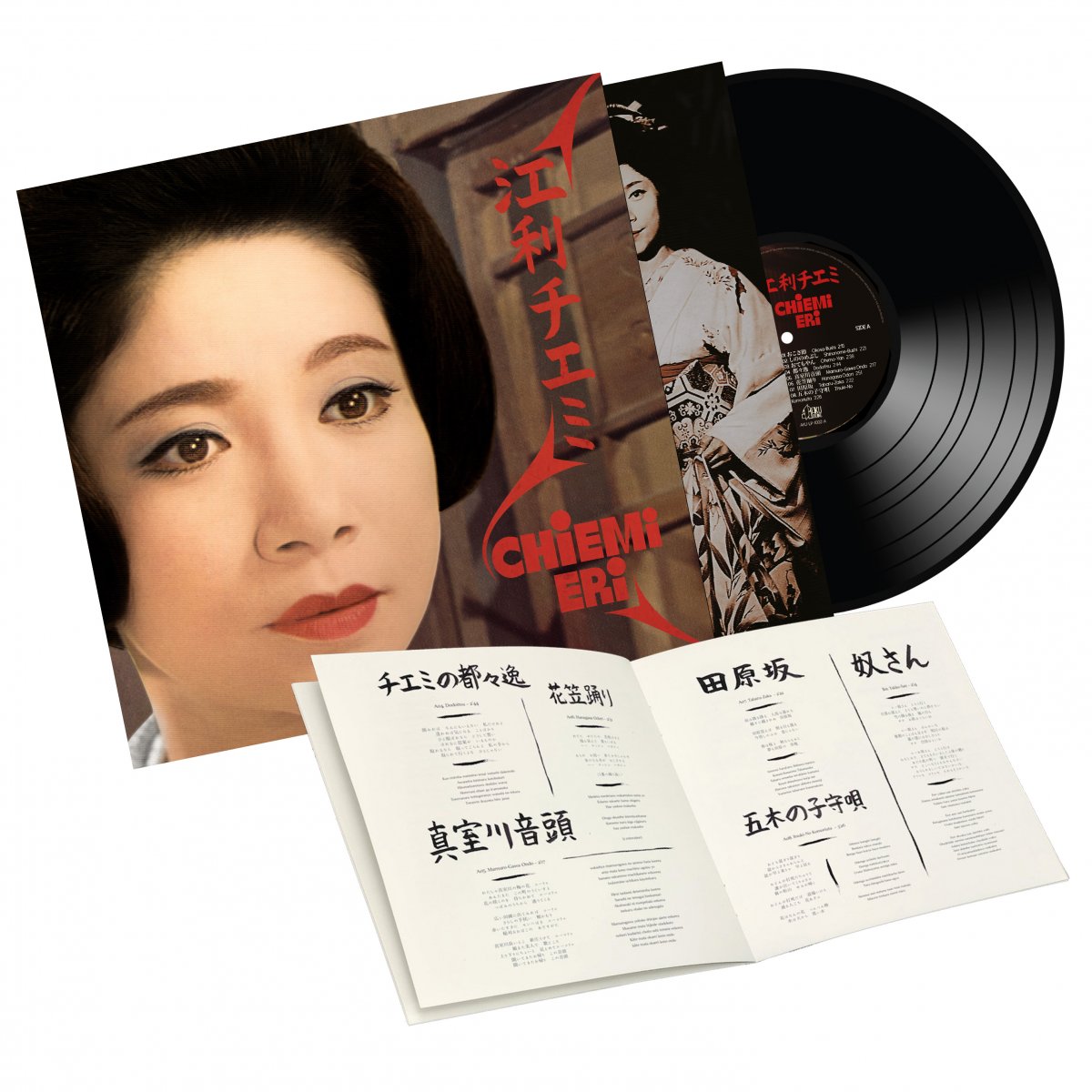With its second release, Akuphone keeps exploring Asia with an original compilation of Japanese singer Chiemi Eri. This edition – which is available in vinyl, CD and digital - includes exclusive liner notes and a rich calligraphed booklet containing the romanization of lyrics. It encourages to (re)discover Chiemi Eri’s recordings. On this compilation, Akuphone has brought together 16 songs from 10 inches albums originally released by King Records (Japan) between 1958 and 1962.
As the daughter of a musician father and a singer mother, Chiemi Eri (1937-1982) grew up in a musical environment. When she was still a teenager, she started a career as a singer on US military bases. She became famous by singing numerous classics from the post-war American musical repertoire. At the age of 14 she recorded the song Tennessee Waltz with King Records, which turned out to be an immediate success, the first of many others.
Chiemi Eri is considered as one of the most famous Japanese singers of the 20th century, more precisely of the Showa era (1926-1989), named after the Japanese emperor of the time, better known under his westernized name Hirohito. Both a singer and an actress – she played in more than 50 films, as well as many theatre plays – she definitely made a mark in the post-war Japanese cultural landscape, along with fellow singer-actresses Izumi Yukimura and Hibari Misora.
The success of these true national icons, who were nicknamed « the three sisters », can be connected to the specific context of the time, that is the cultural opening of Japan which, although initiated a century before, accelerated with the US military occupation of the archipelago (1945-1952). This period saw the import of popular musical styles of the time: jazz, be-bop, swing, mambo, etc, as well as the development of a hybrid musical style - the Kayokyoku - which consists of a delicious mix of so-called “western” music with Japanese music.
Combining vocal jazz, Latino rhythms and Japanese folk, this new compilation of Chiemi Eri offers an original musical syncretism. Supported by Tadaaki Misago and the Tokyo Cuban Boys – the oldest and most prolific latin-jazz group in Japan – Chiemi Eri sings themes, in Japanese, that are mainly taken from the traditional folklore. Thus, the drums and brass of the Cuban arrangements are mixed with the Min’yo, which shows how rich these folk songs are: every region, every local tradition, every event is celebrated by a particular song or dance. Chiemi Eri also reveals the vocal prowess specific to the Min’yo, in particular the kobushi, a sort of melisma – this vocal technic that consists in singing a single syllable while moving between several different notes in succession.
This compilation, which surprisingly blends Min’yo and latin-jazz elements, invites to the discovery of the archipelago from a different perspective.
Pour sa deuxième référence, le label Akuphone explore de nouveau l’Asie avec une compilation inédite de la chanteuse japonaise Chiemi Eri. Disponible en vinyle, CD et digital, cette édition, incluant des liner notes exclusives, et riche d’un livret calligraphié avec la romanisation des paroles, invite à (re)découvrir les enregistrements de Chiemi Eri. Pour cette compilation, Akuphone a sélectionné 16 chansons issues d’albums 25 cm sortis originellement chez King Records (Japan) entre 1958 et 1962.
D’un père musicien et d’une mère chanteuse, Chiemi Eri (1937-1982) baigne très tôt dans l’univers musical, et c’est adolescente qu’elle débute une carrière de chanteuse sur les bases militaires états-uniennes. Elle s’y fait connaître en interprétant de nombreux standards du répertoire musical états-unien d’après-guerre. A 14 ans, elle enregistre chez King Records Tennessee Waltz, lui assurant un succès immédiat, le premier d’une longue série.
Chiemi Eri est reconnue pour être l’une des chanteuses japonaises les plus populaires du 20e siècle, précisément de l’ère Shōwa (1926-1989) du nom de l’empereur japonais mieux connu sous le nom de Hirohito, sa dénomination occidentalisée. À la fois chanteuse et actrice, avec plus d’une cinquantaine de films à son actif, sans compter ses rôles au théâtre, elle a marqué avec Izumi Yukimura et Hibari Misora, chanteuses et actrices également, le paysage culturel japonais de l’après-guerre.
Le succès de ces véritables icônes nationales, on les surnommera « les trois sœurs », peut se lire à travers le contexte particulier de l’époque, celui de l’ouverture culturelle du Japon qui, bien qu’amorcée un siècle plus tôt, s’accélère avec l’occupation de l’archipel par l’armée états-unienne (1945-1952). On assiste alors à l’importation de styles musicaux en vogue à l’époque : jazz, be-bop, swing, mambo, etc., ainsi qu’au développement d’un style musical hybride, le Kayokyoku, soit un savoureux mélange entre musique dite occidentale et musique japonaise.
Entre jazz vocal, rythmes latino et folk japonais, cette compilation inédite de Chiemi Eri offre un syncrétisme musical original. Accompagnée par Tadaaki Misago et les Tokyo Cuban Boys, la formation latin-jazz la plus ancienne et prolifique du Japon, Chiemi Eri chante en japonais des thèmes principalement issues du folklore. Aux arrangements cubains, tout en percussions et en cuivres, se mêlent ainsi le Min’yo, qui donne à voir la richesse de ces chants populaires où, chaque région, chaque tradition locale, chaque événement est célébré par un chant ou une danse particuliers. Chiemi Eri dévoile également des prouesses vocales caractéristiques du Min’yo, notamment avec le kobushi, sorte de mélisme, cette technique vocale qui fait varier plusieurs notes sur une même syllabe.
Chiemi Eri se situe quelque part entre Ella Fitzgerald et Celia Cruz, elle est aussi proche d’un Gainsbourg, qui dès la fin des années 1950 succombe à la révolution Mambo.
Cette compilation, fusion étonnante entre Min’yo et éléments latin-jazz, invite à la découverte de l’archipel sous un œil différent.
「美空ひばり以来の天才少女」などと呼ばれながら不慮の急遽により45歳という若さで亡くなってしまった江利チエミの民謡を唄った音源を集めたコンピレーションがフランスの新鋭レーベルAKUPHONEよりリリース。日本民謡やジャパニーズ・グルーヴの評価が国内だけでなく海外でも高まってきたことを証明するかのようなリリースです。往年のファンから辺境系リスナー、民謡やジャパニーズ・グルーヴを追い求めている方々に大推薦。
"Ce disque est renversant, et franchement indispensable dans sa version vinyle"
Le jeune label français Akuphone n’a que deux sorties à son catalogue, mais c’est déjà la meilleure agence de voyages vers une destination peu connue des mélomanes : l’Asie. Quelques mois après une compilation de l’émouvante chanteuse chinoise Lily Chao, direction le Japon, avec une compilation de chansons enregistrées entre 1958 et 1962 par Chiemi Eri. Chanteuse et actrice, Chiemi Eri serait hyper connue au Japon. Mais comme on connaît très mal le Japon, on ne savait pas. Et on découvre un pli de l’histoire, une chanteuse qui, adolescente au début des années 50, chantait des reprises de country-music pour les soldats sur les bases militaires américaines du Japon. Les morceaux compilés sont ceux où elle était accompagnée par les improbables Tokyo Cuban Boys, un grand orchestre spécialisé dans la musique cubaine (toujours en activité après une soixantaine d’années). A la première seconde, on croit rêver : on entend une autre Yma Sumac, sans le côté foire de la performance vocale. Une chanteuse de swing latino, mais hybridé avec des mélodies et des traditions musicales nippones. Le son et les arrangements sont à tomber par terre, comme des bandes sons de péplums avec des amoureux tragiques qui meurent enlacés à la fin. La voix de Chiemi Eri évoque les cubaines Celia Cruz ou Freddy, mais avec des modulations et des mélismes qui, étrangement, l’approchent parfois d’une princesse orientale, d’une reine de Saba pleurant son exil. Ce disque est renversant, et franchement indispensable dans sa version vinyle.
Par Stéphane Deschamps, Les Inrocks. le 01/04/2016.
http://www.lesinrocks.com/2016/04/01/musique/3-disques-2-livres-voyager-tres-loin-11816574/
--------------
"Eri wears her influences boldly"
Akuphone’s reissue of music by Japanese actress-singer Chiemi Eri presents an intriguing cultural crossroads: based largely on traditional folk songs, many of the lyrics depict traditional Japanese life in the 19th century. However, the music revels in Western sounds from the mid-20th century.
Eri’s first success as a singer came when the 14-year old performed a version of “Tennessee Waltz” in both Japanese and English. That early hit, which liner notes explain sounded like like it was performed by a mature woman, isn’t included on this set. Chiemi Eri features material originally released on the Japanese King label between 1958 and 1962. The singer was barely out of her teens, but her rich voice carries these tracks with a wisdom beyond her years.
“Okosa-Bushi” opens the album with a brassy jazz fanfare, defiant timbres selling a melancholy tale about a man struggling with personal demons after World War II and finding solace the only way he can: singing in a bar. The album’s liner notes include lyrics with transliterations, but not with translations, so we are left with brief summaries to describe songs that often seem like tragic short stories. The brooding “Shinonome-Bushi,” named after a popular red light district, is a protest song that sides with legislation to outlaw prostitution. That hot house atmosphere continues on “Otemo-Yan,” a folk song updated with a brassy arrangement and Latinesque percussion that gives it a definite mid-century pop kick. Eri’s music clearly thrived on American influences, but it’s interesting how the lyrics suggest a nation licking its wounds after the war.
Eri’s keen sense of drama is highlighted on the ballad “Dodoitsu,” which originated in the early 19th century as a song performed by customers of a brothel in Nagoya. Her powerful voice evokes the sadness and exploitation of the brothel’s workers. The uptempo “Mamuro-Gawa Ondo,” on the other hand, could pass as a chase theme from a James Bond movie. The title translates as “Mamuro River Song,” and it’s another traditional source that gets a modern update with a percussive brass line. This music may all seem simply exotic to the Western listener, but imagine what it must have been like for the nation’s folk music to be transformed into such bold pop songs. If American folk music crowds felt betrayed when Bob Dylan went electric, one wonders what the response was to this even more revolutionary updating of the classics.
“Tabaru-Zaka” is one of the album’s most effective ballads, named after a park that would be used as a shooting location for The Last Samurai. The smoldering “Itsuki-No Komoriuta” is a lullaby about a poor nurse,and even though the lyrics provided are untranslated, you can hear the deep sense of loss in the singer’s deep, wavering voice.
Rock ‘n’ roll rhythm guitar starts “Yakko-San,” which dates back to 19th century street performers. Eri sang this updated version in the 1962 film Ginza Love Story. Like much of this album, this is swinging music with an air of sadness, but as her voice turns haughty you hear her sense of humor.
This well-paced album alternates uptempo numbers and ballads, and saves one of its most swinging numbers for the home stretch. A sinuous bass line opens the Latinesque “Kushimoto-Bushi,” about life in a fishing village. Despite that traditional subject, the track but which has shades of Cal Tjader’s Latin jazz smash “Soul Sauce” (recorded several years later — hmmm).
Akuphone’s first release, Lily Chao’s Chinese Folk Songs, featured a pop music that stayed close to the Taiwanese singer’s traditional roots. Eri wears her influences more boldly, and fans of pop music from faraway lands will enjoy this simmering blend of East and West.
By Payt Padua, Spectrum Culture, May 13 2016.
http://spectrumculture.com/2016/05/23/chiemi-eri-chiemi-eri/
--------------
I need to mention this wonderful release, which shows a mixture of perfectly recorded ballroom jazz with Korean traditions in singing mixed with the more mambo-era related jazzy ballroom styled band arrangements. The combination does not create so much a dance era styled effect but a different sophistication of which its combination could contradict in rhythmic sensitivity, but which adaptations are beautiful to listen to, showing complexities in voice, a warm singing worth checking out. A classic if you ask me. Japanese CDs usually are so expensive this affordable re-release becomes a must-have.
By Gerald Van Waes, psychefolk.com.
Additional ressources
Oitoko Soda Yo by Chiemi Eri. (KING RECORDS, 1962)
Alternate recording of Kiso-Bushi by Chiemi Eri. (KING RECORDS, 1968)
Yakko-San interpreted by Sasa-Midori (CROWN RECORDS, 1969)
Télécharger la version française de la biographie de Chiemi Eri
La revue musicale par Matthieu Conquet, Les Matins.
France Culture. le 07/04/2016.
Extract from Ginza Love Story, 銀座の恋の物語 (1962)
Extract from Travels of Hibari and Chiemi 2, ひばりチエミないおしどり千両傘 (1963)

Chiemi Eri. Photo: x



